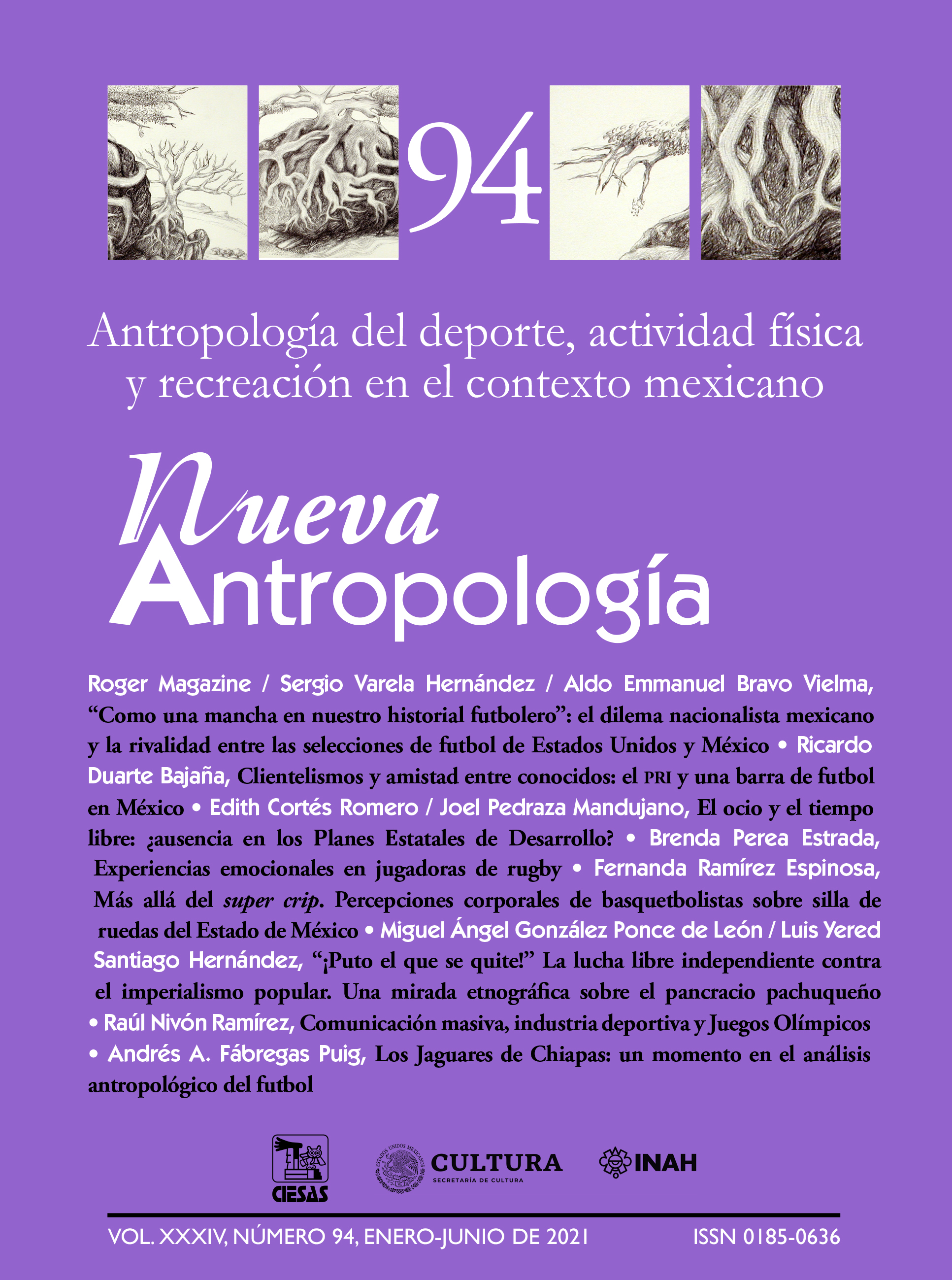"Whore the One Who Takes off!". Independent Wrestling Against Popular Imperialism. An Ethnographic Look at the Pachuqueño Pancracio
Published 2022-01-06
Keywords
- imperialismo popular, lucha libre independiente, straight edge.
How to Cite
Abstract
In this work we aimed to present ethnographic data that allows us to argue about the ways in which collectives that do not hold positions of power try to participate on society and legitimate their own world view from the bottom up. This aspiration can be seen on followers of different sports-spectacle, soccer's and wrestling's being the most known among Pachuca's population. Thus, we focus on independent wrestling in Pachuca, Hidalgo, whose functioning is successful because of the strategies that fighters employ by being themselves the producers and gestors of the show, and by allowing a stronger interaction with their audience. This is how we bring to the table a discussion about how popular culture is built in our country. On the one hand, because of the non-pecuniary origin of independent wrestling, it seems viable to conceive it as more legitimized than mainstream wrestling sponsored by important national and international companies and, above all, Televisa, the biggest television company in Latin America.
Downloads
References
- CRITERIO (2018), “¿Por qué nombraron 11 de Julio a la colonia de Mineral de la Reforma?", Criterio Hidalgo, 12 de julio de 2018, recuperado en: <https://crite-riohidalgo.com/destacado/por-que-nom- braron-11-de-julio-a-la-colonia-de-mien-ral-de-la-reforma>, consultada el 20 de mayo de 2020.
- GARCÍA CANCLINI, Néstor (1987), “Ni folklórico ni masivo: ¿qué es lo popular?", Diálogos de la Comunicación, núm. 17.
- GATCHET, Roger (2009), “The Rhetoric of Monstrosity in Professional Sports Con- troversy", en Barry BRUMMETT (ed.), Sporting Rhetoric. Performance, Games and Politics, Nueva York, Peter Lang.
- GRAMSCI, Antonio (1998), Cartas desde la cárcel, Buenos Aires, Nueva Visión.
- HALL, Stuart (1984), “Notas sobre la deconstrucción de 'lo popular'", en Ralph SAMUEL (ed.), Historia popular y teoría socialista, Crítica, Barcelona.
- HOBSBAWM, Eric y Terence RANGER (eds.) (2002), La invención de la tradición, Crítica, Barcelona.
- MCFARLANE, Kit (2012), “A Sport, A Tradition, A Religion, A Joke: The Need for a Poetics of In-ring Storytelling and a Reclamation of Professional Wrestling as a Global Art", Asiatic, vol. 6, núm. 2, pp. 136-155.
- O'LEARY, John y Pete HAMILL (2001), “La más cara como estrategia", Letras Libres, recuperado en: <https://www.letraslibres.com/mexicoespana/la-mascara-como-estrategia>, consultada el 15 de mayo de 2020.
- PEREDA, Javier y Patricia MURRIETA-FLORES (2011), “The Role of Lucha Libre in the Construction of Mexican Male Identity", Networking Knowledge. Journal of the MeCCSA Postgraduate Network, vol. 4, núm. 1, pp.1-19.
- PONCE, Roberto (2018), “Lucha libre: ¿patrimonio urbano o puro teatro?", Proceso, recuperado en: <https://www.proceso.com.mx/543929/lucha-libre-patrimonio-urbano-o-puro-teatro>, consultada el 15 de mayo de 2020.
- STEVE, Oscar (2018) “Lucha Libre es más allá de 'rudos vs. técnicos': así nació, y evolucionó, el espectáculo deportivo más icónico de México", Xataka, recuperado en: <https://www.xataka.com.mx/otros-1/lucha-libre-es-mas-alla-de-rudos-vs-tecnicos-asi-nacio-y-evoluciono-el-espectaculo-deportivo-mas-iconico-de-mexico>, consultada el 15 de mayo de 2020.
- TORRES, Gabriela (2017), “Arena Afición, 65 años de lucha libre”, El independiente de Hidalgo, 30 de enero de 2017, recuperado en: <https://www.elindepen-dientedehidalgo.com.mx/arena-aficion-65-anos-lucha-libre/>, consultada el 20 de mayo de 2020.
- VARELA, Sergio (2009) “La afición azulcrema y el poder de Televisa. Una aproximación etnográfica al club de futbol América”, Razón y Palabra, núm. 69, recuperado en: <http://www.razonypalabra.org.mx/LA%20AFICION%20-AZULCREMA%20Y%0EL%20PODER%20DE%20TELEVISA%20UNA%20APROXIMACION%20-ETNOGRAFICA%+0AL%20CLUB%20DE%20FUTBOL%20AMERICA.%202009.pdf, consultada el 21 de mayo de 2020.

